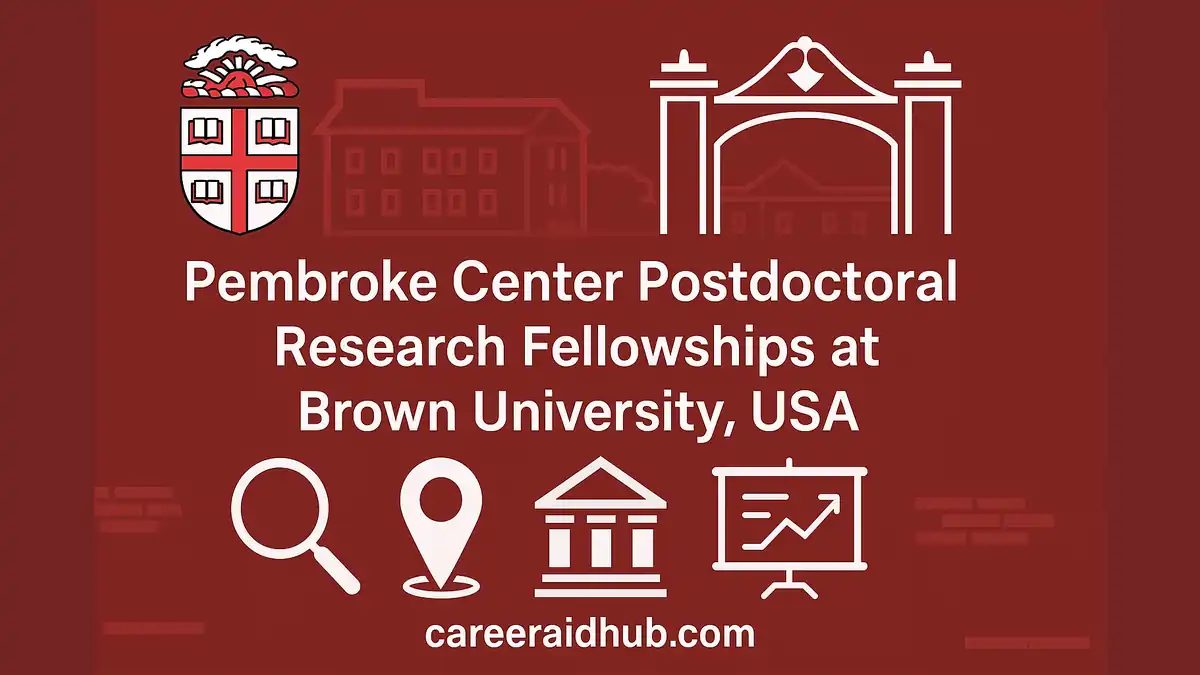Pembroke Center Postdoctoral Research Fellowships: Research, Teaching, and Interdisciplinary Growth
Postdoctoral research fellows play a pivotal role in the Pembroke Center’s vibrant intellectual ecosystem at Brown University. In residence for a full academic year, fellows pursue their own original research, design and teach an undergraduate course, join the weekly Pembroke Seminar, collaborate on Center programming, and grow under the guidance of senior faculty mentors. It’s a rare combination of protected research time, high-level interdisciplinary exchange, and purposeful teaching—anchored in a community that prizes rigorous, critical inquiry.
A year at Brown University’s Pembroke Center is more than a postdoc—it’s a structured, high-impact residency. Fellows advance original research, teach a course they design, join the Pembroke Seminar, shape programming, and gain senior-faculty mentorship. The result: sharpened arguments, tangible outputs, and a durable, interdisciplinary network that supports long-term scholarly growth.
A Year That Catalyzes Scholarship
The Pembroke Center welcomes a small cohort—typically three to four scholars—whose fields and methods complement rather than duplicate one another. The intentional scale allows dynamic dialogue while maintaining breadth across disciplines.
How Structure Drives Momentum
Fellows participate in a weekly research seminar and teach one undergraduate course. This cadence creates a steady rhythm: present ideas, refine methods, translate insights for students,
Cohort Culture and Accountability
Regular work-in-progress sessions, reading exchanges, and cross-cohort feedback loops provide constructive pressure. As arguments mature, fellows identify publication venues, plan archival trips, and outline grant proposals. Over time, this structured accountability helps convert drafts into submissions and conversations into collaborations.
The Pembroke Seminar
At the core of the residency is the Pembroke Seminar—a yearlong, interdisciplinary forum that assembles undergraduates, graduate students, postdocs, faculty, visiting scholars, and invited speakers around a shared theme.
What the Seminar Offers
-
- A common intellectual vocabulary. Weekly discussions align concepts across fields and create a shared grammar for debate.
- Testing ground for arguments. Fellows circulate chapters or article drafts and receive substantive critique from multiple vantage points.
- Public-facing opportunities. The seminar often informs Center programming, enabling fellows to help shape talks, workshops, and symposia.
This deliberate mix extends scholars beyond their subfields while deepening their core projects.
The 2026–2027 Theme: “The Meanings of Merit”
For the 2026–2027 cycle, the seminar theme is “The Meanings of Merit: Labor, Categories of Difference, and the Creation of Knowledge,” led by Paja Faudree (Anthropology/Linguistics).
Why This Theme Matters
The seminar examines how claims about
Potential Angles for Applicants
-
- Metrics and value: Who defines excellence, and how are standards enforced?
- Gatekeeping and labor: In what ways do hiring, peer review, and credentialing encode difference?
- Public discourse: How do public narratives about talent and deservingness shape research agendas and knowledge creation?
Funding, Term, and Benefits
The appointment runs July 2026 – June 2027 (full academic year). Fellows receive an annual salary in the low-to-mid $60,000s (experience-based), $2,000 in research funds, and a one-time $1,000 transition stipend to support relocation to Providence. Postdoctoral Research Associates are eligible for Brown University health and dental benefits.
What the Support Enables
-
- Research acceleration: Conference travel, archival visits, or data acquisition.
- Publication pipeline: Page fees, image permissions, or specialized software.
- Professional visibility: Funds to organize panels, invite respondents, or host small workshops.
Application window (recent cycle): Late November 2025.
Anticipated next cycle: November 2026 (month only; we will update soon).
Eligibility Snapshot
Selection emphasizes scholarly potential and fit
Core Requirements
-
- Ph.D. conferred by the start of the appointment.
- No tenure held at the time of application.
- Recency and mobility: Ph.D. typically earned within the previous five years from an institution other than Brown University, supporting intellectual diversity in training backgrounds.
Competitive Indicators
Evidence of a coherent research arc, publication progress appropriate to the field, and demonstrated capacity to teach an upper-level undergraduate course of one’s own design.
What Distinguishes the Pembroke Model
1) Deep, Guided Interdisciplinarity
Unlike one-off colloquia, the seminar is weekly and year-long. Shared readings, ongoing workshops, and public events produce a continuity of critique that few programs match.
2) Thoughtful Integration of Teaching
Fellows design and teach a course that dovetails with their research. Teaching becomes a laboratory for concepts, sources, and methods—clarifying arguments through discussion and assignment design.
3) A Community Grounded in Feminist Inquiry
The Center’s long-standing focus on the study of “difference” provides not only a thematic anchor but also robust institutional resources—from archival holdings to programmatic collaborations—that amplify fellows’ projects.
4) Cohort Impact Beyond the Center
Because the model stresses publication, pedagogy, and public discourse together, fellows leave with strengthened dossiers, mentoring networks, and an expanded sense of audience.
Resources You
Can Leverage
Archives and Special Collections
The Pembroke Center Archives—including the Feminist Theory Archive and oral histories—offer rich primary materials for research chapters and course assignments. Embedding archival analysis into undergraduate syllabi helps students engage with evidence while fellows refine their own interpretations.
Scholarly Publishing Ecosystem
Monitoring leading journals and participating in editorial conversations can sharpen your method and literature review. Use seminar dialogues to map debates, identify special issues, and target venues.
How to Craft a Competitive Application
The application typically requests a CV, cover letter (including a proposed course description), and a writing sample of up to 7,000 words. Finalists submit an abstract, a five-page project statement with bibliography, three confidential letters, and a complete syllabus for an upper-level Gender and Sexuality Studies seminar.
Map Your Project to the Theme—With Precision
Explain how your archive, site, or corpus reveals the entanglements of value, expertise, labor, and difference. Specify the bodies of literature you engage and the claims you advance.
Design a Teachable, Research-Linked Course
Articulate learning goals and signature assignments, and show how weekly readings build conceptual tools. If your work spans film, sound, or performance, include analytic labs or media practicums.
Choose a Writing Sample That Shows Argument and Method
Select a piece where your analytical engine is visible—how you move from materials to claims. If an excerpt, add a brief framing note to situate its stakes in the larger project.
Make the Five-Page Statement a Mini-Blueprint
Cover:
- Question and intervention; 2) Cases and archives; 3) Method/theory; 4) Year plan (drafts, submissions, conferences); 5) Seminar synergies (archives to consult, programming to join, collaborators to approach).
Align Your Letters
Brief recommenders on the seminar’s weekly cadence and the program’s emphasis on interdisciplinary dialogue and undergraduate teaching.
What Success Looks Like by June
Strong fellowship years often yield:
-
- 1–2 article submissions or a well-developed book chapter;
- A field-tested syllabus ready for future courses;
- Collaborations seeded through the seminar and Center events;
- A sharper public voice where appropriate (well-placed essays, panel appearances, or podcasts).
Tracking Outcomes and Next Steps
Document milestones monthly, maintain a publications tracker, and schedule debrief meetings with mentors. These practices translate fellowship momentum into post-fellowship opportunities.
Is This Fellowship for You?
Consider the Pembroke Center if you:
-
- Work at the intersection of gender/sexuality and broader formations of difference (race, class, ethnicity, disability, nationality) and seek sustained, critical engagement.
- Value interdisciplinary rigor and weekly accountability that propels chapters to completion.
- Want to teach a course of your own design that grows directly out of your research.
- Will benefit from material support (salary, research funds, relocation stipend) and access to archives, journals, and programming that accelerate publication.
Key Details at a Glance
-
- Term: July 2026 – June 2027 (residential, full-time)
- Compensation: Salary in the low-to-mid $60,000s (experience-based) + $2,000 research funds + $1,000 transition stipend; health and dental eligibility
- Expectations: Weekly seminar participation; teach one undergraduate course; active role in Center programming
- Eligibility: Ph.D. in hand by start; degree typically within the last five years; not tenured; Ph.D. from an institution other than Brown
- Deadline (recent cycle): November 2025 (month only); apply via Interfolio (see official page)
- Anticipated next cycle: November 2026 (month only; we will update soon)
Feature Summary
|
Feature |
Details |
|
Program Name |
Pembroke Center Postdoctoral Research Fellowships |
|
Host Country |
United States (Providence, Rhode Island) |
|
Funded By |
Pembroke Center, Brown University |
|
Duration |
12 months (July – June) |
|
Study Mode |
Full-time, in-residence |
|
Eligibility |
Ph.D. by start; degree typically within 5 years; not tenured; Ph.D. from an institution other than Brown |
|
Financial Support |
Salary (low-to-mid $60,000s), $2,000 research funds, $1,000 transition stipend; health and dental eligibility |
|
Fields of Study |
Interdisciplinary; strong alignment with Gender and Sexuality Studies and the annual seminar theme |
|
Deadline |
November 2025 (month only) |
|
Official Website |
References
Call to Action:
Planning to apply in the next cycle? Start by mapping your project to “The Meanings of Merit,” draft your course outline, and line up recommenders. Then, schedule monthly milestones to keep your manuscript and syllabus on track.
Frequently Asked Questions (FAQs)
It is a one-year, residential postdoctoral appointment combining original research, an undergraduate course of your design, the Pembroke Seminar, programming collaboration, and faculty mentorship.
Applicants must hold a Ph.D. by the start date, be non-tenured, and typically have earned the degree within the last five years from an institution other than Brown.
Fellows teach one undergraduate course they design. Moreover, the course typically aligns with their research and the seminar’s theme for maximum scholarly synergy.
Fellows receive a competitive salary, research funds, and a transition stipend. Additionally, they are eligible for Brown University health and dental benefits.
The Pembroke Seminar is a weekly, yearlong interdisciplinary forum. Consequently, it anchors cohort dialogue, shapes programming, and strengthens each fellow’s research trajectory.
Applications typically open in late autumn. Therefore, candidates should prepare materials early and monitor the official page for the latest instructions and exact dates.
Yes, international scholars may apply. Furthermore, Brown’s international support teams advise on visas and onboarding steps once offers are issued.
Projects should align with the annual seminar theme and feminist inquiry into difference, including intersections with gender, sexuality, race, class, labor, and knowledge production.
Premium Mentorship for a Stronger Application
- Premium Mentorship: personalised 1:1 guidance for this and similar opportunities
- In-depth review of your CV, academic profile, and key statements
- Aligned with international selection criteria so your profile matches what panels expect
- Stronger, more compelling narrative for highly competitive calls
- Step-by-step support from opportunity mapping to final submission (fee-based)










